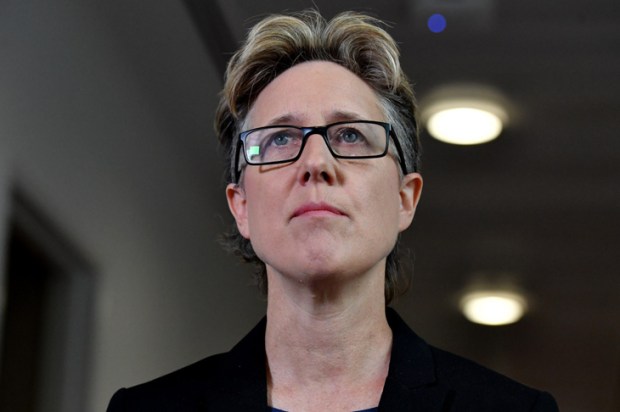Just a month from the Queensland state election, free speech was dealt a severe blow during the final sitting week of the state’s 57th parliament when the government rammed through its Respect at Work and Other Matters Amendment Bill 2024 that hands a sword to activists seeking to silence the opinions of mainstream Queenslanders.
The legislation is the swan song of outgoing Attorney-General Yvette D’Ath, who announced she will not be seeking re-election in October, after almost 17 years in state and federal politics.
At its core, the new legislation undermines free speech in Queensland by expanding the definition of ‘unlawful’ speech. The law introduces a nebulous ‘harm provision’, which makes unlawful speech that a ‘reasonable person’ could consider ‘hateful towards’ another person based on certain protected traits.
At no point is ‘hateful’ defined in the legislation. This means it will inevitably be bureaucrats at the Queensland Human Rights Commission (QHRC) that determine its meaning. Once a person makes a vilification complaint to the QHRC, these bureaucrats will assess the merits of the complaint and decide whether it progresses to the next stage of conciliation.
Make no mistake, the Queensland government’s attack on free speech was premeditated, and masked by obfuscation at every step. The laws are framed innocently enough, named after the Australian Human Rights Commission’s 2020 investigation, the Respect@Work: Sexual Harassment National Inquiry Report. However, the laws draw heavily from the QHRC’s 2021 report, Building Belonging: Review of Queensland’s Anti-Discrimination Act 1991. This report contained 46 recommendations supposedly aimed at ‘modernising and strengthening’ Queensland’s anti-discrimination laws. Chief among these recommendations is that existing laws be completely overhauled and replaced with a new anti-discrimination Act. The state government attempted to do just that, circulating draft legislation in early 2024 for community consultation.
It quickly became clear that the community was in no mood for an overhaul of the state’s anti-discrimination laws, which would attack mainstream Queenslanders. Such was the backlash from the public that the state government was forced to abandon the Bill months out from the election, in fear of electoral oblivion.
However, having gone back to the drawing board, the state government has managed to pass the most aggressive provisions of its abandoned draft Bill and it did so by curtailing the ability of opponents to properly scrutinise its intentions.
Before its passage, the legislation was referred to the Community Safety and Legal Affairs Committee, which was tasked with rushing through the consultation of nearly 40 stakeholders in just two months. While the committee ultimately recommended the Bill be passed, the process at the very least provided an opportunity to examine the government’s proposals in detail and cross-examine staff from the Department of Justice and Attorney-General on the legal ambiguity that shrouded much of the Bill.
It became abundantly clear on Tuesday 10 September that the state government had little interest in the informed scrutiny of its legislation. On the only day that the legislation was debated, the Attorney-General introduced comprehensive amendments to the Bill, effectively giving the opposition an hour to consider them before the law was passed in the evening. Among the eleventh-hour amendments were even greater powers for the QHRC, including broadening its ability to investigate workplaces.
As the shadow attorney-general Tim Nicholls remarked, ‘These amendments…are being circulated just prior to lunch and expected to be passed before this day’s sitting is finished…. This is not the way that proper legislation ought to be passed. This is legislation by creep, not legislation by scrutiny and proper passage.’
The result has seen a dangerous and ill-defined ‘frankenbill’, dressed up as reforms aimed at protecting Queensland women, become law. And while better outcomes for the state’s women are vital, these reforms have little to do with their safety, and instead prevent all Queenslanders, including women, from expressing themselves by lowering the threshold for so-called ‘hate speech’.
The legislation, through its expanded vilification provisions, empowers activists to shut down public debate by labelling any opinion with which they disagree ‘hateful towards’ them, as part of a vilification complaint to the QHRC.
It would also give the QHRC unprecedented powers to investigate workplaces for failing to eliminate ‘objectionable conduct’, including speech, merely on the suspicion of the QHRC Commissioner, while providing Queenslanders with no assurance that they will not be subject to politically motivated investigations.
Queensland’s faith leaders have repeatedly expressed their concern that the laws would empower the QHRC to shut down their expression of beliefs by enabling activists to complain these beliefs are ‘hateful towards’ other people. To give the illusion the state government was responsive to Queenslanders of faith, the Attorney-General tabled a four-page letter sent to the inter-church organisation Queensland Churches Together on the morning that the law was passed, but again allowed no time for a considered response.
In the letter, the Attorney-General told faith communities that most ‘hate speech’ is communicated ‘in a coded way’. The cold irony is that the churches should view this itself as a coded warning not to teach doctrines that might be construed by activists as ‘hateful towards’ others.
As the new laws are unclear and untested, Queenslanders will be living with a great deal of uncertainty about whether their actions or words are lawful under the ambiguous new standards.
Analysis by the Institute of Public Affairs has established that attempting to outlaw speech and acts considered ‘hateful’ violates the fundamental legal principle that those subject to the law must be capable of understanding their obligations under it, and that the law must be applied in an impartial manner.
In what could be the dying days of the Queensland state Labor government it seems it has left its best attack on free speech for last.
The hope is that Queenslanders take note of this attempt to silence them and demand their next government restore their fundamental right to free speech.
Got something to add? Join the discussion and comment below.
Margaret Chambers is a Research Fellow at the Institute of Public Affairs
You might disagree with half of it, but you’ll enjoy reading all of it. Try your first month for free, then just $2 a week for the remainder of your first year.













